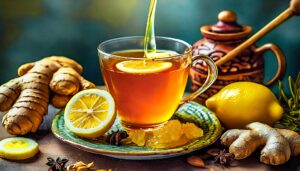This blog post about natural remedies for cold and flu season is intended for informational and educational purposes only. The information provided herein is not a substitute for professional medical advice, diagnosis, or treatment. It is essential to consult with a qualified healthcare provider or physician before making any significant changes to your diet, wellness routine, or supplementation regimen, especially if you have underlying medical conditions, are pregnant, nursing, or taking medications.
As the air turns crisp and the leaves begin their graceful descent, we find ourselves at the cusp of that inevitable seasonal shift — the cold and flu season.
seasonal shift — the cold and flu season.
For many of us, this time of year brings not only the anticipation of cozy nights and warm drinks, but also the looming threat of sniffling noses and persistent coughs.
The cold and flu season, notorious for its disruptive impact on our daily lives, poses a significant challenge to our wellness and vitality, especially for those of us in the midst of bustling routines.
In the quest to maintain our well-being during these chilly months, exploring natural remedies can be a prudent and empowering choice.
Traditional medicine has its place, but exploring the world of natural remedies gives us a chance to harness the healing energies of the natural world.
Embracing these gentle, yet effective alternatives lets us support our health and take a sustainable approach to our own wellness.
In this comprehensive guide, we’ll delve into the depths of natural remedies, unveiling a treasure trove of strategies and solutions to fortify your defenses and alleviate the discomforts brought by the cold and flu season.
From bolstering your immune system with nourishing foods to discovering the potency of herbal supplements, we’ll explore a plethora of tools and techniques to help you navigate this season with resilience and grace.
Understanding Cold and Flu
First, let’s discuss the differences between the common cold and the flu.
While both are respiratory illnesses, they are caused by different viruses and exhibit distinct symptom profiles.
The symptoms of a common cold are usually less severe and include:
- Runny or stuffy nose
- Sneezing
- A mild cough
On the other hand, the flu frequently exhibits more severe symptoms, such as:
- A high fever
- Tiredness
- Body aches
- A dry cough
Determining the appropriate course of action for recovery and assessing the severity of the illness depend heavily on an understanding of these distinctions.
How Cold and Flu Spread
Understanding the modes of transmission for cold and flu viruses is paramount in adopting preventive measures.
This probably requires less explanation post-pandemic, but bears repeating nonetheless, since the modes of transmission are identical to COVID-19.
Fun Fact: The common cold is also a coronavirus.
Cold and flu viruses are typically transmitted via respiratory droplets released when an infected person coughs, sneezes, or speaks.
People in the vicinity may inhale these droplets into their lungs or take them in by mouth or normal respiration, which leads to infection.
Touching surfaces contaminated with the virus and then touching one’s face can also contribute to the spread of these illnesses.
Practicing good hygiene and maintaining a clean environment are crucial in minimizing the risk of contracting and spreading these viruses.
Are You Susceptible?
Several factors can influence our susceptibility to colds and flu during the seasonal transition.
- A weakened immune system, often the result of poor nutrition.
- Inadequate sleep
- Chronic stress
These factors can leave us more vulnerable to viral infections.
Close contact with infected people or exposure to crowded areas can also increase the chance of getting these infections.
Understanding these contributing factors empowers us to take proactive measures in bolstering our immune defenses and implementing preventive strategies, reducing the likelihood of succumbing to the seasonal onslaught of colds and flu.
Building a Strong Immune System
It’s never too late to begin. Our first line of defense against the seasonal colds and flu is a strong immune system. Before we even consider natural remedies for cold and flu season, we need to evaluate how we live our lives.
Adopting a healthy lifestyle and a holistic approach to wellbeing can greatly enhance our body’s natural defenses against these viral invaders.
Regular physical activity, healthy eating, stress reduction, and adequate sleep all support a robust immune system that keeps our bodies prepared to face the difficulties of the cold and flu season.
Nutritional Strategies for Boosting Your Immune System
When it comes to strengthening our immune systems, the old adage “you are what you eat” is accurate. Including meals high in vitamins, minerals, and antioxidants is essential for boosting our immune system.
Our immune system is bolstered by fresh fruits and vegetables, especially those rich in beta-carotene and vitamin C.
Including sources of healthy fats, lean protein, and probiotics also helps to maintain a strong gut flora, which strengthens our body’s defenses against viral infections.
Exercise and Its Impact on Immune Function
Frequent physical activity has a major impact on our immune system in addition to enhancing general wellbeing.
It has been demonstrated that moderate exercise improves immunological surveillance and lowers the risk of respiratory infections, like the flu and colds.
Including exercise in our daily routines, whether it be a vigorous yoga class, a brisk walk in the crisp autumn air, or an intense aerobics class, can act as a powerful catalyst in strengthening our body’s natural defense mechanisms, making us stronger and more resilient come wintertime.
The Role of Stress Management in Immune Health
Effective stress management in the middle of our hectic life is essential to keeping a strong immune system.
Long-term stress can weaken our body’s defenses against infections, increasing our vulnerability to the flu and colds.
To strengthen our immune system, we must incorporate stress-reduction strategies including deep breathing exercises, mindfulness, and participation in rejuvenating and relaxing activities.
Fostering a sense of calm and balance allows us to equip ourselves with the resilience needed to navigate the seasonal changes with grace and vitality.
Natural Remedies for Cold and Flu Season
Herbal supplements have long been valued for their ability to strengthen the immune system, which makes them useful partners in our fight against the flu and colds.
Known for its antiviral and antibacterial qualities, echinacea has been study proven to boost immunity and prevent illness.
In a similar vein, astragalus, which is highly valued in traditional Chinese medicine, has strong immune-modulating properties that strengthen our bodies’ inherent defenses.
Additionally, the adaptogenic herb, Asian ginseng, aids in enhancing overall immune function, contributing to a heightened resilience against seasonal illnesses.
The Effectiveness of Vitamin C, D, and Zinc in Preventing Illness
Vitamins and minerals are vital for strengthening our immune systems and are therefore essential in our fight against the flu and cold.
Celebrated for its antioxidant qualities, vitamin C aids in the development of white blood cells, which are essential in the fight against infections.
Also known as the “sunshine vitamin,” vitamin D strengthens our immune system and lowers our risk of respiratory infections in addition to supporting bone health.
As a powerful defense against seasonal illnesses, zinc is an important mineral that promotes immune cell activity.
Incorporating Probiotics for a Healthy Gut and Immunity
Maintaining a robust gut microbiome plays a crucial role in strengthening our immune system, providing a strong barrier against the entry of cold and flu viruses.
Probiotics, or the good bacteria that live in our stomachs, are essential for controlling immunological response, lowering inflammation, and strengthening our body’s defenses against infections.
By including foods high in probiotics, like kefir, sauerkraut, kimchi, and yogurt, we may create a healthy gut environment and strengthen our immune systems so we can take on the challenges of the changing seasons with strength.
The Benefits of Elderberry, Echinacea, and Garlic for Immune Support
Nature’s arsenal offers us a bounty of immune-supporting treasures, with elderberry, echinacea, and garlic standing as formidable defenders and powerful natural remedies for cold and flu season.
Elderberry, known for its antiviral qualities, boosts immunity and helps prevent viral infections in addition to lessening the intensity and length of cold and flu symptoms.
Echinacea is known for its capacity to boost immunity and plays a crucial role in averting respiratory infections, providing us with a strong defense against cold and flu symptoms.
Garlic is well-known for its antibacterial and immune-stimulating qualities, is a potent ally in the fight against seasonal illnesses, giving us the strength and vigor to face the shifting weather.
Natural Remedies for Cold and Flu Symptom Relief
Warm herbal teas can provide much-needed relief from the agony of a nagging cold or flu by relaxing our throats and relieving chronic coughing.
Herbs with anti-inflammatory and calming qualities, like licorice root, chamomile, and peppermint, can ease throat discomfort and lessen coughing.
The natural sweetness of these teas is enhanced by the addition of a small amount of honey, which also soothes and heals sore throats, making them ideal for the cold and flu season.
Steam Inhalation with Essential Oils for Congestion Relief
The congestion and stuffiness that accompany the common cold and flu can be particularly vexing, impeding our ability to breathe freely and feel comfortable.
Steam inhalation infused with essential oils offers a simple yet effective remedy for clearing nasal passages and alleviating congestion.
Eucalyptus and peppermint oils, renowned for their decongestant properties, help to open up airways, promoting easier breathing and providing much-needed relief from nasal discomfort.
This soothing practice not only eases congestion but also promotes relaxation, fostering a sense of tranquility amidst the chaos of seasonal illness.
Homemade Remedies for Cough and Sore Throat
When faced with the persistent annoyance of coughs and sore throats, turning to homemade remedies can offer a natural and comforting approach to alleviating these symptoms.
From warm saltwater gargles that soothe throat irritation to homemade cough syrups infused with honey, lemon, and a touch of cayenne pepper, these simple yet potent remedies provide relief from discomfort while nurturing our bodies with the goodness of natural ingredients.
Embracing these time-honored practices not only eases symptoms but also instills a sense of empowerment in taking charge of our health and well-being during the cold and flu season.
The Role of Honey and Ginger in Soothing Symptoms
Honey and ginger, celebrated for their therapeutic properties, stand as stalwart allies in our pursuit of relief from cold and flu symptoms.
Honey, with its antimicrobial and soothing qualities, helps to alleviate coughs and soothe irritated throats, offering a natural and delicious way to ease discomfort.
Ginger, revered for its anti-inflammatory and immune-boosting properties, aids in reducing congestion and relieving nausea, providing a holistic approach to symptom management.
Whether incorporated into teas, homemade remedies, or enjoyed on their own, the combined benefits of honey and ginger serve as a comforting and effective remedy for navigating the challenges brought by the cold and flu season.
Lifestyle Practices during Cold and Flu Season
Maintaining careful cleanliness is vital in our hectic everyday lives.
Wash hands frequently, use hand sanitizers, and sanitize touched surfaces to lower the risk of spreading viral diseases.
Adopt proper cough and sneeze etiquette to contain respiratory droplets and foster a healthier environment.
Importance of Staying Hydrated During Illness
Staying hydrated during a cold or flu is essential for natural healing.
Consume fluids, including herbal teas, broths, and water, to reduce mucus, ease congestion, and prevent dehydration.
Electrolyte-rich beverages aid in replenishing essential nutrients, contributing to a swift recovery.
Restorative Practices for Faster Recovery
Embracing restorative practices expedites recovery. Prioritize ample rest and sleep for recuperation.
Create a peaceful environment with cozy bedding, soft lighting, and relaxing scents for better sleep.
Modest exercise, like yoga or tai chi, helps fight viruses, restoring balance and vitality.
Incorporating Immune-Boosting Foods Into the Diet
Eating foods that strengthen the immune system is crucial. Include a range of fruits and vegetables high in vitamins, minerals, and antioxidants.
Incorporate legumes, nuts, seeds, poultry, fish, and avocados for essential nutrients.
A diet rich in these foods improves defense mechanisms, enhancing resilience during the cold and flu season.
When to Seek Medical Attention
While managing cold and flu symptoms at home is often feasible, indications such as prolonged high fever, dyspnea, chest pain, intense headaches, or exacerbation of pre-existing medical disorders require prompt medical attention.
New or concerning symptoms beyond the normal duration necessitate a thorough evaluation to rule out complications and ensure timely care.
Understanding When a Cold or Flu Could Lead to Complications
Though colds and flu are often self-limiting, certain risk factors and complications, especially for individuals with weakened immune systems or chronic conditions like diabetes or heart disease, require careful monitoring.
Complications may include sinus infections, pneumonia, bronchitis, and worsening chronic diseases. It’s crucial to stay alert and seek medical attention promptly if symptoms develop or persist longer than expected.
Importance of Consulting a Healthcare Professional for Severe Symptoms
For effective management of cold and flu-related problems, consulting a physician is essential, especially for severe symptoms like persistent high fever, breathing problems, chest pain, or disorientation.
Those with long-term health issues, the elderly, and young children should consult a physician at the onset of symptoms to avoid complications and ensure a quick recovery.
Seeking medical advice not only provides peace of mind but also fosters a comprehensive approach to managing illness, promoting optimal health during the challenging cold and flu season.
Wrapping Things Up
As we traverse the crisp landscapes of fall and winter, let us embolden ourselves to embrace the healing power of nature, drawing strength from the bountiful array of natural remedies for cold and flu season at our disposal.
By putting an emphasis on natural methods of wellness, we develop a close relationship with our bodies and the environment in addition to a sustainable and aware way of living.
With a fresh feeling of purpose, let’s set out on this trip, nourishing our health with the abundance of natural cures and clearing the path for a better and more resilient cold and flu season.
BONUS – Barbara O’Neill’s Flu Bomb Recipe
For: Cold, flu, pneumonia, COVID-19, pleurisy, asthma, and other respiratory illnesses.
- Garlic – 1 to 4 cloves according to your preference; crushed
- Ginger – ¼ teaspoon; finely grated
- Eucalyptus Oil – 1 drop (Substitute Tea Tree Oil if you don’t have Eucalyptus) From Kathleen: I’m a little wary of ingestion of essential oils. Most experts recommend against ingestion. I’d personally add 1 tsp of elderberry tincture after the other ingredients have simmered. Elderberry shouldn’t be cooked—heat destroys vitamin C.
- Cayenne Pepper – Dash to ½ teaspoon according to your preference
- Juice of 1 lemon
- Honey – 1 Teaspoon
- Water – ½ Cup
Combine all ingredients in small pot (except the Elderberry!) and simmer on stove for 20 minutes. Drink 3 times per day for relief of symptoms in 3 days.







